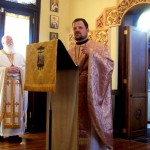 by Humbert of Romans
by Humbert of Romans
CHAPTER ONE
IV. The Benefits Which It Brings to the Preacher; the Office of Preaching: Part Two
In other instances this inspired exclamation of which we speak may take the form of a prayer. For example, the story is told about a certain nobleman who, for many yeas, was preoccupied with the distracting and empty pursuits of the world but, by listening to a preacher, was eventually brought to consider the things of God, to probe into the workings of his soul, and to occupy himself now with his eternal salvation. And when it came his time to die, this thankful man, thinking of how much he owed his director for his conversion, raised his heart to God and prayed:
“I beseech You, oh my Savior, be kind to him who has taught me to know You.”
There is no doubt that many other listeners devoutly pray in a like manner for those who preach to them, especially when the harbingers of God’s Kingdom are in the habit of beseeching this prayerful remembrance either at the beginning or at the end of their sermons; a custom which St. Paul rarely failed to observe. They can reasonably expect tremendous graces from such prayers, especially when many are united in the same intention, for Christ Himself said that no prayer uttered by several of the Faithful joined in a common plea would go unanswered (Matt. 18:19).
Often, moreover, the devotion which a preacher inspires causes the people to follow him in order to hear him propound the teachings of Christ, a fact which we ourselves have sometimes witnessed. Again on can turn to the Gospels for confirmation of this; for when Jesus preached, the people, assembling from various sectors, followed Him closely, even into the desert. And not only did the anxious hearers accompany Him, they also ministered to Him, as St. Mark notes. This respect and this keen interest extended, after His departure, to His Apostles and disciples:
“You did not reject or despise me; but you received me as an angel of God, even as Christ Jesus” (Gal. 4:14),
wrote the zealous St. Paul to the Galatians. There is nothing astonishing about this love for God’s preachers:
“Let the presbyters who rule be held worthy of double honor, especially those who labor in the word and in teaching” (I Tim. 5:17).
Their renown steadily increases and, like Judas Maccabee, whose fame spread even to the ends of the world (I Maccabees 3:9), their names, too, gradually become universally known. In short,
“their sound hath gone forth into all the earth” (Ps. 18:5);
their preaching gains for them the admiration of mankind.
All those who put into practice the instructions they receive from the ministers of the Gospel cannot fail to recognize that they thereby become the children in Jesus Christ of these same preachers.
“For in Christ Jesus, through the gospel, did I beget you” (I Cor. 4:15)
was the way the Apostle expressed it to the Corinthians. This feeling of filial piety ought to be most precious in the eyes of the preacher; for it is meet that he be frequently blessed, served, honored, and esteemed by so many worthy sons in Our Lord Jesus Christ.
There is assured to the sincere preacher, then, a threefold benefit. He is provided with whatever is necessary for his earthy existence; he acquires numerous spiritual benefits; and he gains the devotion of the people.
But over and above these blessings which provide only for the present life there are many other more valuable benefits which concern the future happiness of the preacher: Firstly, he has the firmest certitude about his salvation, for the Savior shows mercy to men according as they themselves have shown compassion to others, as is explained by St. Luke’s words:
“Forgive and you shall be forgiven; give, and it shall be given to you” (Luke 6:37-38).
It is no vain hope to expect that one who has saved others by his words will himself likewise be received into heaven, for we have the evidence of Jeremiah in this matter. Secondly, he shall receive a very great reward. In fact, it is more than likely that the charity which he practices, not only to advance in virtue himself but also to lead others, increases more and more in him by its very exercise; and everyone knows that upon this progress depends the degree of eternal reward that awaits every soul. With this thought the Bridegroom of he canticle concerns Himself when He promises:
“Two hundred pieces of gold for them that keep the fruit of the vine” (Cant. 8:12),
which is interpreted by the gloss as referring to the teachers of the people. Hence, a double recompense belongs to these leaders, for they have worked doubly in saving themselves and in leading others to Christ. Thirdly, besides rejoicing in that which is common to every eternal reward, the preacher shall have an accidental increase in glory from the joy found in those he has saved.
“So that you may know,” wrote St. Paul to the Ephesians, “what is the exceeding greatness of His power towards us” (Eph. 1:19)
– words which show, observes the gloss, that the most renowned teachers shall receive a special glory added to that which is promised to all. And this glory, according to the interpretation of leading scholars, is an accidental glory added to the substantial glory. But if such be the case for the great doctors because they are teachers, then one is forced to admit a like reward for others who also have been, in every sense of the word, teachers, and who shall receive an increase in glory which will be measured by their individual merit. Consequently, every preacher shall be entitled, in a certain degree, to this increase. There are several reasons for saying this, among which are the following: the gloss says of the text cited above, that the Apostles shall be clothed with a particular brilliance and that this supernatural glory shall clearly correspond to the splendor which surrounded them when they were the lights of the world. Now, since every worthy preacher is a light, for it is of such that we read:
“Thy lightnings enlightened the world” (Ps. 66:19),
there is no doubt that they will shine with the same brilliance in their eternal home:
“They who instruct many to justice, shall shine as stars for all eternity” (Dan. 12:3).
Add to these persuasions the assurance of the Gospel that it is better to do and to teach than merely to do, and it becomes increasingly clear that, if each one is to be rewarded according to his merits, justice demands that there be a double compensation on judgment day for those who have performed the double task of doing and teaching. Our Lord indicated this in the words which St. Matthew has recorded:
“Whoever carries them [commandments] out and teaches them, he shall called great in the kingdom of heaven” (Matt. 5:9).
Just as one notes different ranks of honor at the court of an earthly prince, some being in nobler places than others, so we shall see preachers assigned, not to the lowest, but to the highest places in the heavenly kingdom.
St. John, speaking of this matter of reward, notes:
“When He appears we shall be like to Him” (I John 3:2).
The glory of the elect, therefore, shall depend on the glory of God and, the more perfect is their resemblance to the Creator, the more brilliant shall their glory be. Applying this norm to preachers we see that they resemble Christ by the perfect use of their rational faculties; and in addition, in the opinion of many writers, the ministers of God are worth of the glory which Exodus (Exod. 25:25) and the gloss attribute to martyrs and to virgins; for they resemble virgins by the perfect use of their lustful faculty and martyrs in the exercise of their irascible faculty. These three point of resemblance are for preachers so many pledges of their future elevation to singular honor in the company of the Blessed.
Another dignity for preachers is the fact that they engage in battle the serpent of old:
“Michael and his angels battled with the dragon” (Rev. 12:7).
Preachers form part of the militia of angels, who, under command of St. Michael, wage war against Satan and the legions of Hell. And if David, for fighting against Goliath, rose so high in glory that the people sang his praises upon his return from the remarkable conquest of the giant, what glory must await the preacher when he enters paradise, having battled with such courage against enemies so much more formidable.
In the eyes of men, another source of additional glory is to be elevated above all others in a large assembly, either by precedence or in any other way.
“Thou shalt have authority over ten towns,” Christ said to the good and faithful servant (Luke 19:17).
By “towns,” according to the gloss, is meant the souls that have been converted with the aid of preaching of the Divine Word as contained in the Gospels; and God shall justly raise in glory him who has worthily implanted in the hearts of others the treasures of His Divine Word.
Glory and honor are equally assured to anyone who presents himself at the court of a king with a large and dignified retinue, and the good preacher assuredly has this advantage because he does not present himself alone and unescorted to the King of Heaven; rather, he is accompanied by all whom he has saved. With this very thought in mind the learned St. Gregory declared:
“Then Peter shall appear with converted Judea, which he leads; then Paul leading, so to speak, the whole world which he converted; then Andrew with Achaia, John with Asia, Thomas with India; in short, there shall be all the shepherds of the flock of Christ like rams who bring behind them the docile flock.”
Finally, to be presented and crowned with a diadem before princes and people is, undeniably, a rare honor; yet, this is what awaits the preacher who has worthily performed his duties:
“Come,” it is written, “you shall be crowned from the top of Amana, from the top of Sanir and Hermon. . . .” (Song. 4:8).
The meaning of these words, according to the gloss, is: Whenever preachers make outstanding conversions, their future crown is further embellished because of the many struggles they have endured in carrying on their work. This explains what St. Paul meant when he wrote to the Thessalonians:
“What is our crown of glory, if not you before our Lord Jesus Christ . . .?” (I Thess. 2:19.)
From all that has been said, it is clear that a particular glory belongs to the preacher. And this results from the fullness of his charity, from the sublimity of his office, from his likeness to Christ Himself, from his resistance to the devil, and from the brilliance of the diadem with which he shall be crowned.
This includes the reward for his labors in the present as well as that which awaits him in the future. In order to confirm this conclusion, recall the significance of these words from the Book of Ecclesiasticus:
“The lips of many shall bless him that is liberal in his bread” (Ecclus. 31:28).
That is to say, according to the gloss: the faithful dispenser of the bread, which is the word of God, shall be blessed in the present life and in the life to come: hence, the spreading of spiritual benefits is a precious assurance of Divine blessings.
![]()
This is an excerpt from the Preachers Institute publication:
On the Formation of Preachers
You can purchase the Ebook HERE, the Kindle version HERE
and the Paperback by clicking the image above.

